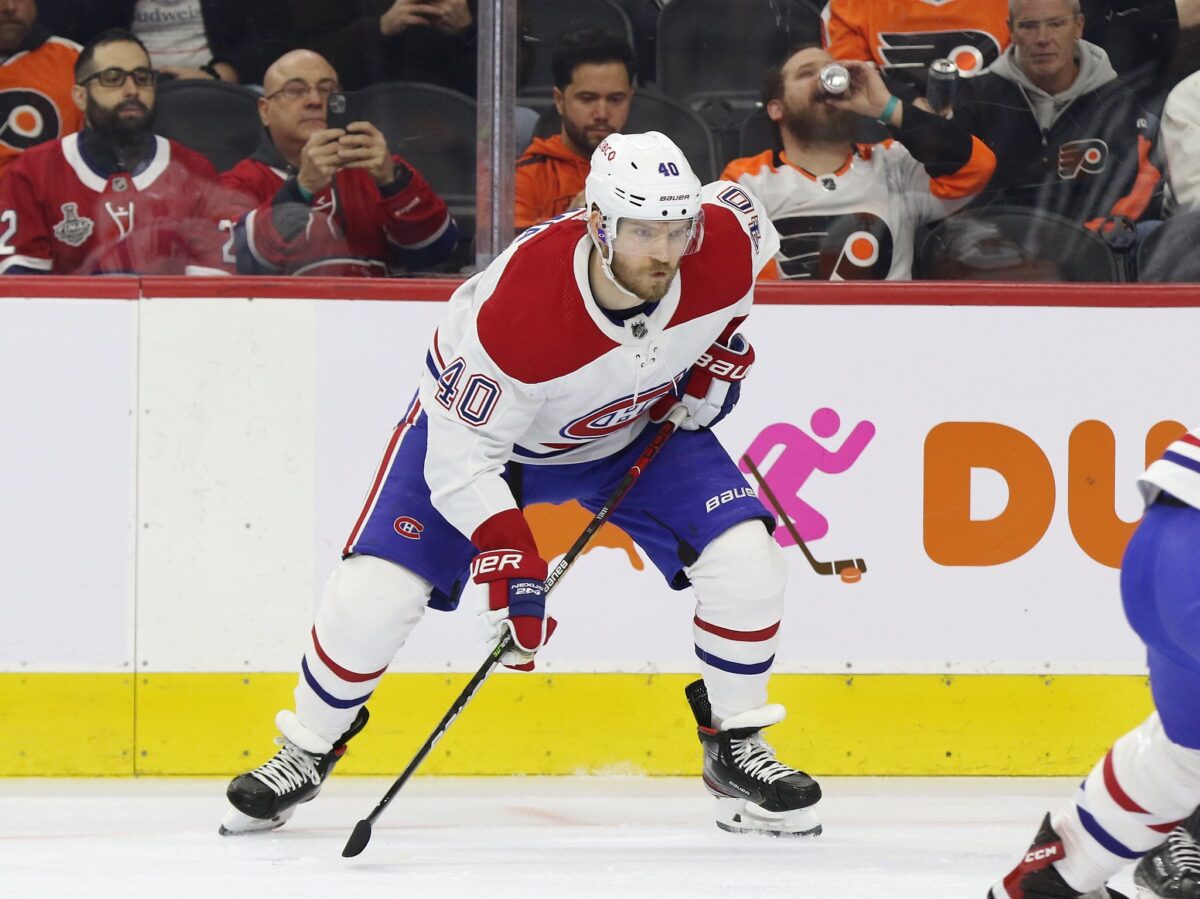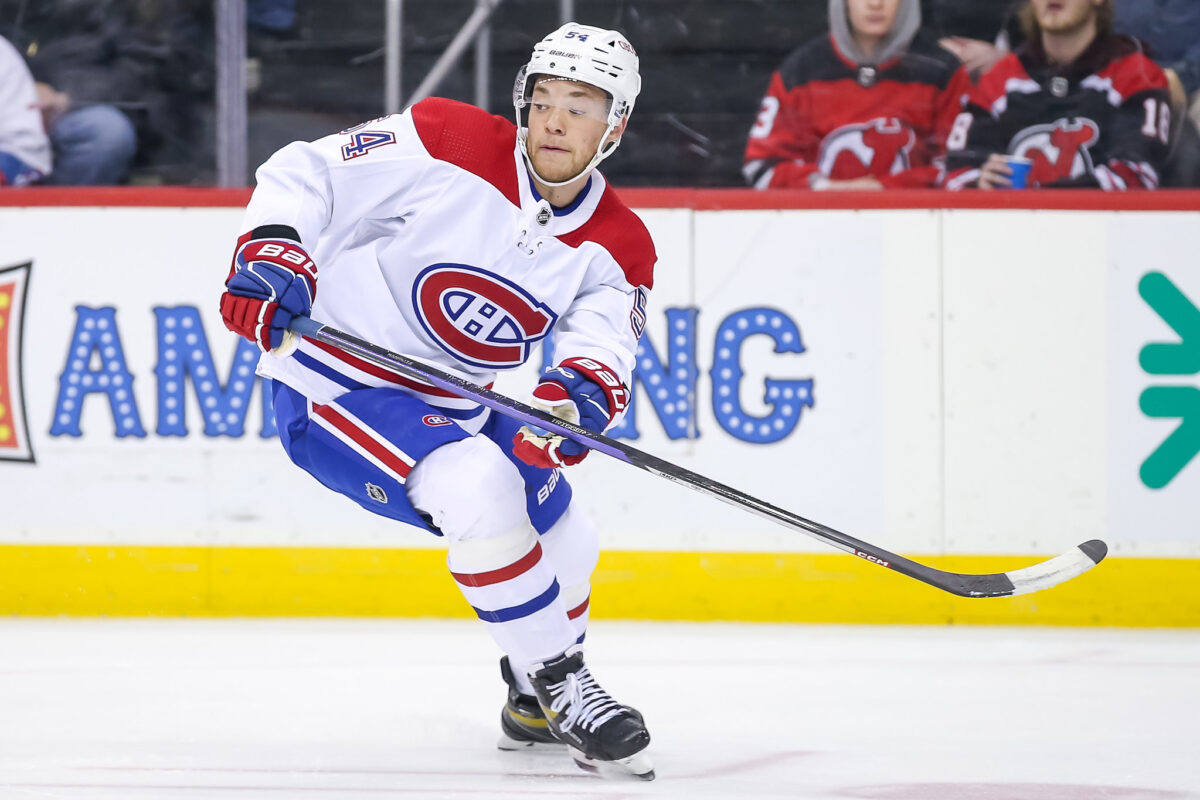The Montreal Canadiens have begun their annual western road trip, and even though they are over .500, and the final wild-card position is within reach, there are still three teams between them and the postseason. With the team in only the second year of a rebuild, there is no need for general manager Kent Hughes to rush the process.
Related: Canadiens Prospects Poised to Excel at 2024 WJC
There will be many discussions about keeping certain veterans or trading them at the deadline – if the value of keeping them is higher than what the trade market can provide. We will look at the balancing act Hughes faces in the coming months.
Canadiens Trade Bait at Forward
There are going to be several Canadiens forwards made available. Christian Dvorak, Jake Evans, and Joel Armia are the most obvious. However, they are all signed to deals that go beyond this season.

With contending teams looking to improve, the big decision will be whether to keep or trade Sean Monahan. Some want to keep him in Montreal, which makes sense as he is a high-quality center who is adept at winning faceoffs with an impressive 57.3%-win rate, he is averaging just over 18 minutes per game and is on pace for a 50-point season. With the loss of Kirby Dach to injury, Monahan has stabilized the top six.
If he were to be extended, it couldn’t be for much more than $4 million to $5 million. Even with the salary cap expected to go up to $87.7 million, Montreal needs as much room as possible to extend their young players in a year or two and be able to go hunting for any needs on the unrestricted free-agent market.
Monahan, however, is the one forward who is likely to fetch a quality return, maybe a first-round pick or an equivalent prospect. Some teams will be looking to add a veteran center who can play on the wing as well and be reliable in the middle six. He is also a strong penalty killer and has experience on the power play. At a cap hit of only $2 million, he is a bargain for teams near the cap ceiling.
This will be a difficult choice for Hughes – should he keep Monahan on the roster to help stabilize the top six in the medium term? Is it worthwhile keeping him to help mentor the young core, especially the centers that need help in the faceoff circle? Or is his trade value just too good to pass up?
At 29 years old, Monahan is not right for the current core group, as several young centers will be coming up, and there is still Dvorak available to be a mentor and win faceoffs, even though he is not a top-six center. If Hughes does get an offer for a first or equivalent prospect, he should make the trade. Mentorship in a rebuild is important, but so is adding young quality assets.
Canadiens Trade Bait on Defense
Montreal has one of the youngest rosters in the NHL and can rely on their youth to be dependable on the blue line. Justin Barron, Jordan Harris, Arber Xhekaj, and now Jayden Struble have shown they are all NHL-capable defenders. Then there are the up-and-comers like Lane Hutson, Adam Engstrom and David Reinbacher. There is no shortage of quality defensemen in the Canadiens’ system. This is a position of strength for Montreal that Hughes must exploit.

Several contending teams will be looking to improve their defensive corps and add a stay-at-home defender like David Savard, and they would be getting him for two playoff runs as his $3.5 million per season contract has one more season beyond this one.
The right-handed defender is of high value to the Canadiens. He provides them with a solid penalty killer, but more importantly, he’s a veteran with Stanley Cup experience who can mentor their young, promising blue line. Players like Kaiden Guhle have benefitted from his leadership, which could also bolster his value on the trade market, especially for teams much closer to being contenders with a young defense corp, such as the New Jersey Devils. Perhaps a team like the Toronto Maple Leafs would finally address their need for playoff experience and toughness.
Savard may not look appealing according to analytics because he’s being used as a top-pairing defenseman in Montreal. However, when placed in his correct role as a third-pairing D-man, he becomes an ideal addition to a roster. His return on the trade market may not be a high-end prospect, but Hughes could try to use him in a package deal to get what the team needs most, an offensively gifted forward.
Offence has been hard to come by for the Canadiens. Injuries, inexperience, and lack of skilled depth all factor into this problem. With the blue line finally building into the more modern group of young puck-movers, the offence has been coming from there. At forward, however, the team still needs to add skill. This is why Hughes must leverage his veterans to try and add assets that could fill that need rather than bet on a playoff run.
